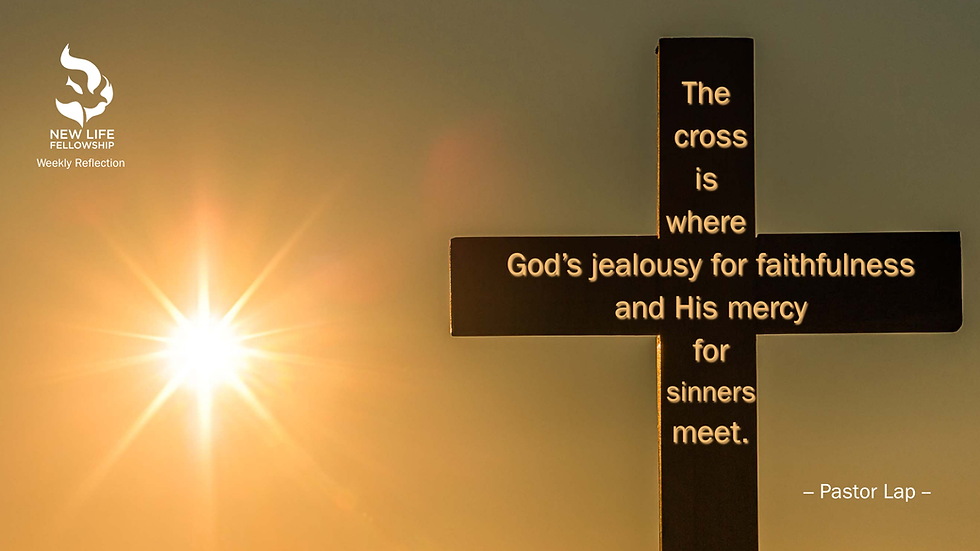KNOW YOUR WATER SOURCES
- Pastor Lap Dinh
- Dec 18, 2020
- 3 min read
(Further reflections on “Seeking Emptiness” — Sunday 13-Dec-2020)

A cistern in ancient times is man-made (dug in rock and plastered) used for collecting water during rainy season and supplying water for a community/household. A cistern (pit/well) , in metaphoric usages, means one’s wife whom a man should find satisfaction with her (Proverbs 5:15). The breaking of the wheel at the cistern (Ecclesiastes 12:6) means death. Experiencing great danger may be compared to being thrown alive into a cistern from which one may cry to the Lord (Lamentation 3:53–55) and be delivered (Psalm 40:2).
When the prophet Jeremiah (2:13) contrasted the two pictures between the fountain of living water and a broken cistern that cannot hold the water, he (was commanded by the Lord) specifically spoke it clear that God’s people have committed two evils, namely, forsaking the Lord as the fountain of their living waters and (b) hewing for themselves broken cisterns. Not only God’s people, the Israelites at that time were indicted, people of God at any time are prone to commit those two of evils. People may not say that they have forsaken the Lord with their mouth, but with their heart/mind and lifestyle they build their own “cisterns” and thinking they will be safe. A cistern, figuratively speaking, can mean something that they rely on heavily because they trust in the works of their hands rather that the works of God through His word.
In order to appreciate the contrasting picture between broken cisterns and the fountain, we need to pay attention to the their differences.
People need to draw water from cisterns and the water, though it is drinkable, has contaminants (usually with everything from animal carcasses to human feces that are found in the water passages). Unlike cisterns, water flows out or spring up from fountains and it is always fresh/pure.
Drinkers of cisterns will need to build and upkeep their cisterns from breaking at any point. As we witness that almost all (if not all) trusted worldwide “cisterns” in this pandemic has proven to be “broken.” They cannot hold the “water” and won’t refresh the soul. Those who trusted water from their own “cisterns” will find themselves being dried up, disoriented, isolated, and depressed. There seems to be two main reactions. People begin to either desperately seek the Lord intimately or anxiously desert the Lord as they are frantically trying to fix their broken “cisterns.”
Drinkers of water from the fountain will simply drink from the living water and give thanks to the Source. Unlike cisterns, they don’t need draw water and upkeep its leakiness by nature. And the water supply from the Fountain, Jesus Christ, is overflowing and unending.
Alright, I’ve got it. Now how do I practically know what I’m (spiritually) drinking from? Well, it’s simple but might not be easy. Ask yourselves these questions.
How tiring is it for you to try to be a good Christian? What is your number one struggle? How does the Gospel/Good News that you know all along help you in addressing your personal issues? Who is your number one trusted person that you go to (and simply vent out your turmoils). Is there a (hidden and broken) “cistern” that you have been trusting, depending on, kept coming back to even you know it’s not working and it has never been working? Why do you still want to try to fix a broken “cistern” instead of surrendering and seeking the Fountain of the Living Water? Are there issues of guilt, shame, and fear (of something to be known)? What are your “inner voices, reasoning or urging to keep drawing water from your “broken cisterns?” Is there a habitual sin or self-reliance or substance-dependence in your life that you know for certain that does not build you up, but “messily” crack you down? Why do you continue to trust its emptied and broken promises.
Though the above questions are not comprehensive, they can be helpful to you in exploring your inner thoughts/feelings or cognitive dissonance. My prayers and hope that you will come to drink from the Fountain of the Living Water and not your own/other cisterns regardless how they (deceptively) appear well-built.
In the Fountain, we drink. Amen.
—
Pastor Lap




Comments